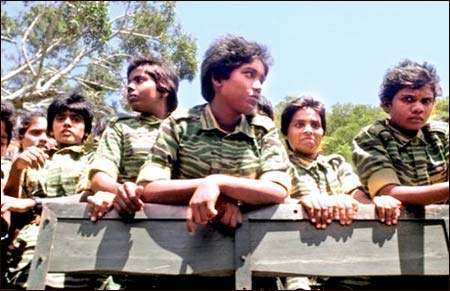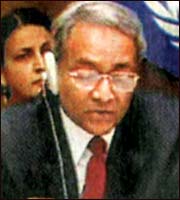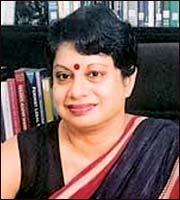|
Zero-tolerance policy:
Use of children in conflict
Statement by Attorney-General of Sri
Lanka Mohan Peiris during the interactive dialogue with Special
Representative of the Secretary-General for Children and Armed Conflict
Dr Radhika Coomaraswamy at the 15th Session of the UN Human Rights
Council, Geneva
"The Government always understood that it was not that easy to be a
child soldier. We were acutely aware that they just had to do it. We
have readily rehabilitated them. We will never be afraid of these
children. They will always be considered our children. We will give them
all the love, care and protection to the best of our ability."
"My delegation has taken note of the statement made by Dr Radhika
Coomaraswamy to this Council and opening this interactive dialogue. Dr
Coomaraswamy's work in respect of children and armed conflict is
noteworthy.
|

LTTE child soldiers. File photo |
Throughout the three-decade long conflict, the Government continued
to uphold and enforce a zero-tolerance policy towards abduction and use
of children in armed conflict. The end of the conflict situation in Sri
Lanka in May 2009 marked a significant new beginning for the former
child combatants. As the LTTE no longer had the ruthless capacity to
forcibly separate children from their families, the abominable practice
of forced recruitment of child soldiers ceased to exist. Parents in the
North and East of Sri Lanka are now able to raise their children in a
secure environment enjoying the rights and freedoms that are the
hallmarks of Sri Lanka's democratic society.
Child combatants
The Government has concertedly sought to ensure the protection and
promotion of the rights of former child combatants and their successful
reintegration back into society. Significantly, this process was
premised on them being identified as victims and not as offenders.
A total of 667 former child combatants underwent rehabilitation since
May 2009 of whom 316 are boys and 351 are girls. The period of
rehabilitation was one year or less. All 667 children have been released
and reunited with their parents and families.
The rehabilitation process involved psychosocial counselling,
spiritual guidance and social rehabilitation, special education classes
and vocational training.
According to the Government regulations, children are to be entrusted
to their parents or other custodians after one year of such
rehabilitation through an order by a Magistrate on the basis of a
comprehensive review undertaken by educationist, counsellors, vocational
training instructors and the Magistrate's office representatives.
While under rehabilitations, former child combatants were produced
twice before a Magistrate for a review of their progress.
Throughout the conflict and in the post-conflict phase, the
Government of Sri Lanka continued to co-operate and work closely with
the office of the Special Representative and thank her and her special
envoys who visited Sri Lanka in the past, for their support and advice
extended to the Government throughout this challenging period. Sri Lanka
was among the first UN Member States to set up a National Task Force in
accordance with UN Security Council Resolutions 1539 and 1612 to monitor
and report on child conscription.
|

Attorney-General of Sri Lanka
Mohan Peiris |

Dr Radhika Coomaraswamy |
The Justice Ministry in collaboration with officials of the Defence
Ministry and the Local Police have taken steps to determine the
whereabouts of the four remaining children alleged to be associated with
the TMVP, including the two cases signalled in the December 2009 report
of the Special Envoy of the Special Representative.
The matter has been inquired into and the results seem to strongly
suggest that the practice of recruitment of children and young persons
as combatants has completely stopped. The UNICEF too has been closely
involved in such investigations.
Armed conflict
The Government reiterates therefore that in post-conflict Sri Lanka,
there is no situation of child recruitment for the purpose of combat, in
any part of the country.
While the Government is fully committed to continuing its dialogue
with the office of the Special Representative, UNICEF and all other UN
agencies concerned with the care and protection of children, we are of
the view that children in armed conflict is no longer an issue for
concern.
Finally, the Government of Sri Lanka looks forward to continuing this
constructive dialogue also with the Committee on the Rights of the Child
later this month during the consideration of Sri Lanka's Third and
Fourth periodic report under the Convention on the Rights of the Child
and initial report under its Optional Protocol on the involvement of
children in armed conflict. |



